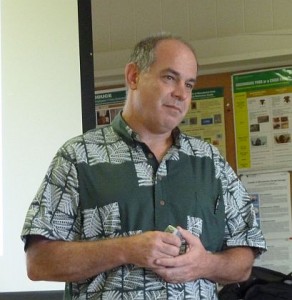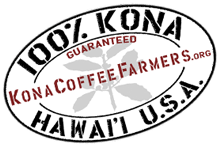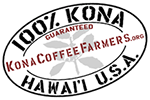The Independent Voice
Newsletter of the Kona Coffee Farmers Association
June 2012
PO Box 5436 Kailua Kona Hawaii 96745 USA
www.konacoffeefarmers.org info@konacoffeefarmers.org
Contents
Message from President
Legislative Update
Agricultural Theft Presentation
Kona Coffee Does Not Stand Alone
Be One – Bring One
Seahorse/Lobster Tour – June 12
New Member Barbeque – August 19
EDITOR: Clare Wilson
“The Importance of Being Earnest” – about Coffee Farming
Driving the 1.75 miles up from Mamalahoa to my house, I see over 18 different coffee farms. Some are healthy, but others scream a lack of vigor, and on our road… too little fertilizer seems to be the most prevalent issue on the poorer farms. Like feeding a child to grow healthy, skimping on fertilizer makes for sad growth. Another problem is not pruning regularly which makes for bushy out of whack plants and more importantly… growth which blocks the valuable light to create strong and healthy limbs (bones) for the plant’s Future Growth. The last problem I see is an overuse of Round-Up, etc. – which makes the soil look quite dead. It means the roots of coffee trees which are close to the surface can’t possibly get what they need. Healthy land and healthy plants means healthy potential.
To be earnest means to consistently do the right thing every year so that when Mother Nature has given us adequate moisture in years like this, your coffee trees can attempt to fulfill their destiny, even in spite of pests.
For this elevation (1900 feet) and exposure (South Kona), if I would dare suggest to my neighbor farmers:
Fertilizing whether organic or inorganic should be done when plants are actively growing and perhaps 2- 3 times year April, June and September depending on the rains. Use a good fertilizer like: 15.5.25 or 10.5.20 or 12.4.22 and adequately apply evenly and not just at the base of the tree. The roots extend out approximately as far as the branches do. Don’t hold back on their nutrition.
Pruning takes place from about January thru April. Wait for the rains to come because pruning stimulates growth. Pruning under dry conditions will stress your trees. Be sensitive. And chop up and pile your prunings or chip them, so they will become future organic material. Return to your land what your land has given you. Don’t burn or take them to the dump. (Except CBB raisins in a tied dense bag, of course.)
Weed Control: Weed control takes place year long-groan. Weed whacking/mowing is best. The soil is then protected from heavy run-off because of the existing roots. Be judicious if you use Round-Up, etc. Too many chemicals hurt the existing organic and biological material in your soil.
Be earnest and consistent every year, in the care of your coffee trees and you’ll receive the rewards. Here in mid-2012 even while fighting CBB etc., give your coffee trees the chance they deserve.
Mahalo! Cecelia Smith President, KCFA
LEGISLATIVE UPDATE
HB 280 Repeal of Mandatory Inspection and Certification
Over 700 people have signed the KCFA online petition asking Governor Abercrombie to veto HB280. On May 21, at the request of KCFA Board Member Tom Butler, the Governor’s Advisory Council for West Hawaii sent a hard copy of the petition (with the names of the signers and their comments) to the Governor—along with the Council’s concurrence in the request. We do not want a return to the type of self-certification that led to the Kona Kai coffee counterfeiting scandal of the mid-1990s. The Governor has until June 17 to exercise his veto power.
HB280 $196,000 for CBB Eradication & Tree Destruction
At the same May 21 meeting of the Governor’s Advisory Council, KCFA members Bob Smith and Wayne Tanaka asked the Council to urge the Governor to direct the HDOA to send a full-time entomologist to Kona for the purpose of developing a science-based CBB mitigation program adapted to Kona and other Hawaii County regions. They urged that the $196,000 be used to help fund the entomologist’s work—rather than for destruction of infested coffee trees.
Submitted by Bruce Corker, Legislative Chairperson
 “Yikes – I’ve been robbed!”
“Yikes – I’ve been robbed!”
On Thursday May 24th, Deputy Prosecutor Mitch Roth met with about two dozen KCFA members to talk about agricultural theft. It was a lively meeting with many questions and comments. Notable points are that the police are not as knowledgeable about agricultural crimes as in other areas. We have to remind them that a class C Felony theft of an agricultural equipment, supplies, commodity or product only requires having a value of more than $100, or a product weight of more than 25 pounds (Hawaii Revised Statutes §708-831). So, theft of a single partial bag of cherry is a class C felony! Someone damaging your equipment or trees amounting to $500 damage or more is also a class C felony (HRS §708-821). And it seems that the police are more interested in pursuing felonies rather than misdemeanors.
Ag theft has been a big problem in the past, so laws were passed to help track and identify stolen goods. We were reminded that the law (HRS §145-22, HRS §145-23) requires two copies of a simple certificate of ownership to be carried along with the transport of agricultural commodities with a value of at least $100 or weighing more than 200 pounds. The certificate is nothing more than a simple piece of paper you can generate yourself with your name, the origin of the goods (TMK number is suggested), and the name of the destination (say to a processor for sale or for services like pulping, dry-milling, roasting). The police or HDOA can stop you and ask for this proof of ownership (HRS §145-24). IF you don’t, it can be considered prima facie evidence of theft (HRS §708-831), and they can seize the agricultural commodities (HRS §145-27).
We were also updated on the laws regarding criminal trespass on private property (HRS §708-814) and the limited liability of landowners for injury to trespassers on their property.
If you have questions you can contact the Deputy Prosecutor’s office in Hilo at 808-961-0466.
Submitted by Paul Uster, Education & Grants, Chairperson
Kona coffee does not stand alone! ![]()
Recently Napa Valley Vintners (NVV) has decided to join Kona coffee and Idaho potatoes as members of the Organization for an International Geographical Indications Network (oriGIn). This group represents over 400 Napa grape growers and has defined with federal recognition what can be labeled as Napa wine must include 75% Napa grapes to use that name!
Furthermore, Kona coffee, Idaho potatoes and Missouri pecans came together to form American Origin Products Association (AOPA) for which there will be a founding conference in October in Fayetteville, Arkansas. That said, it is of note that NVV has also become a member of AOPA, since they share the basic foundational desires of promoting and protecting their product of designated geographical origin.
Kona Coffee Farmers Association works nationally and internationally in order to ally with other groups who have similar goals in mind and legally can work with and learn from one another. As North American Vice President of oriGIn, Colehour Bondera will continue to strengthen these relations and bring the viable experiences home to Hawaii.
Submitted by Colehour Bondera, Geographical Identities, Chairperson
 Be One – Bring One
Be One – Bring One
It is June and we await the decision of our Governor on legislation that impacts us as Kona Coffee Farmers. Will HB280 be vetoed or signed into law? The fate of our effort to have the Bill defeated may be a sign of just how many Kona Coffee Farmers it takes to make a loud enough statement. I heard one politician say, “The Governor’s attention has been gotten”. This attention is a testament to the number (volume) of signatures on our petition, and the number “volume” of emails that have been written to the Governor about this Bill. Loudness does count.
This is just one of the reasons for joining together as members of The Kona Coffee Farmers Association; one voice is hard to hear, but voices joined together cannot be ignored. We also join to keep current with the events in the coffee world, to share our farming methods and to learn from both each other and from outside speakers who bring their expertise to our events. We join because we care about the survival and success of Kona Coffee; the name, the product, the Heritage. We join because we truly have something in common with anyone who is passionate about growing or drinking Kona Coffee.
So, I have a question: How much more successful could our organization be if we could turn up our volume?
What if there were twice as many of us tomorrow as there are of us today?
Just how much more could we share if there were twice as many Kona Coffee Farmers who availed themselves of our educational programs and our CBB Talk Story?
Just how much more confidence would we have in the fact that we are not alone in our efforts to grow and market quality Kona Coffee if we had twice as many farmers tomorrow to contribute their ideas and expertise to the rest of the our Kona Coffee Farming community?
Just how much more exposure and recognition of the 100% Kona Coffee Name would be gained in the business realm if we had twice as many Supporting Business members tomorrow than we do today?
Just how much quicker would our message about 100% Kona Coffee spread if we had twice as many Associate Members tomorrow as we have today?
What if we could double the volume of our voice tomorrow in the state legislature?
We will not know the answers to these questions until there are twice as many members tomorrow as there are today. So a challenge to each of our present members:
Today I thank you for BEing ONE.
Tomorrow I ask you to BRING ONE.
I think each of us probably knows one Kona Coffee Farmer who is not now a member of the KCFA.
Imagine if each of us was to invite and encourage and sign-up that one non-member to become a member. My personal experience is that word of mouth and personal connection are the best tools for encouraging people to join in a conversation, to add their voice.
If each of us would BRING ONE more member into the organization, we would double the volume of our voice for our mission to promote and protect the Kona Coffee Heritage Crop and Name.
When should you do this? Okay, I know you are shy; so think about this and take your time choosing who you will BRING. Share your excitement about The Kona Coffee Farmer’s Association and how it has helped you. Show them our website, and how easy it is to join us on-line. Your friend or neighbor who you recruit has a lot to gain by joining the KCFA. Why would you want to delay? Why would you want to deprive them of those benefits?
And by the way it is perfectly okay to bring more than one. So start now!
The “BE ONE – BRING ONE” challenge deadline? December 31, 2012.
Can we double our membership by January 1, 2013? With your help we can.
Submitted by Louise Hanna, Membership Chairperson
 New Member Barbeque
New Member Barbeque
This is an advance notice about the Welcome New Member BBQ which will be held at Two Step on August 19. More information will be available in future editions of the Newsletter.
Submitted by Mary Lou Moss, Fundraising & Social Events Chairperson

